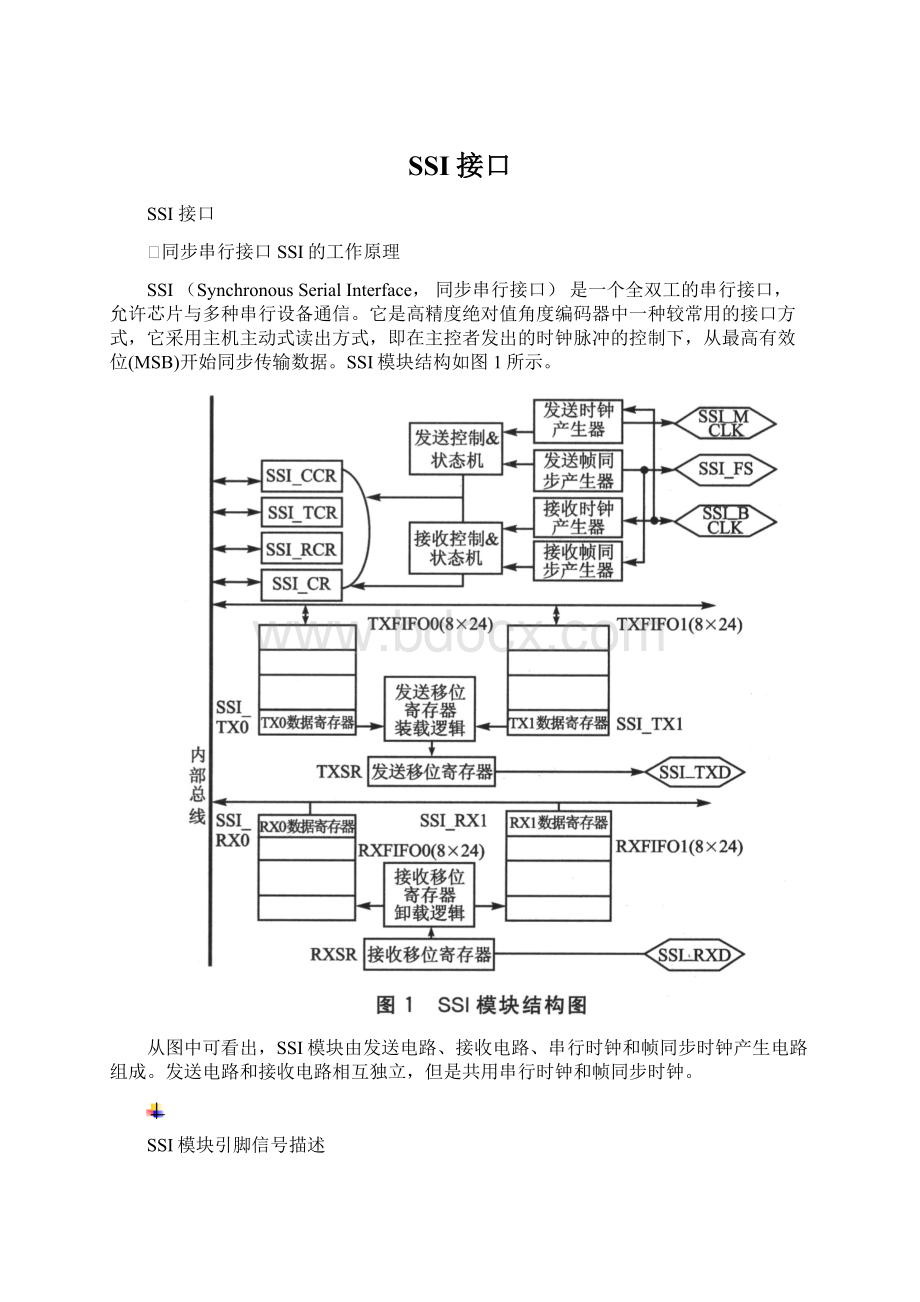SSI接口.docx
《SSI接口.docx》由会员分享,可在线阅读,更多相关《SSI接口.docx(7页珍藏版)》请在冰豆网上搜索。

SSI接口
SSI接口
Ø同步串行接口SSI的工作原理
SSI(SynchronousSerialInterface,同步串行接口)是一个全双工的串行接口,允许芯片与多种串行设备通信。
它是高精度绝对值角度编码器中一种较常用的接口方式,它采用主机主动式读出方式,即在主控者发出的时钟脉冲的控制下,从最高有效位(MSB)开始同步传输数据。
SSI模块结构如图1所示。
从图中可看出,SSI模块由发送电路、接收电路、串行时钟和帧同步时钟产生电路组成。
发送电路和接收电路相互独立,但是共用串行时钟和帧同步时钟。
SSI模块引脚信号描述
SSICLKIN:
SSI时钟输入信号。
SSI_BCLK:
SSI串行比特时钟。
SSI_MCLK:
SSI串行主时钟信号,在SSI主模式下,
该信号也作为过采样时钟信号。
SSI_FS:
SSI串行帧同步信号。
SSL_RXD:
SSI串行接收数据信号。
SSI_TXD:
SSI串行发送数据信号。
SSI的操作模式
SSI有3种基本同步操作模式:
普通模式、网络模式和门时钟模式。
普通模式是最简单的模式,一帧内只能传输一个字,而且每一帧都需要帧同步信号来控制同步;网络模式主要用于多时隙的情况下,一帧内可以传输2个字到32个字不等;门时钟SSI_BCLK模式下,串行比特时钟SSI_BCLK指示了发送引脚或接收引脚上的有效数据,所以不需要帧同步信号。
除了上述3种基本模式外,针对音频上的应用,SSI还支持两种衍生模式——I2S模式和AC97模式,分别用于传输I2S和AC97音频格式数据。
SSI的初始化
初始化SSI模块的正确顺序:
①上电或重启SSI(SSI_CR[SSI_EN]=0),即关闭SSI模块功能。
②配置SSI模块。
涉及的寄存器包括控制寄存器SSI_CR、中断允许寄存器SSI_IER、发送配置寄存器SSI_TCR、接收配置寄存器SSI_RCR和时钟控制寄存器SSI_CCR。
③通过SSI_IER寄存器设置必要的中断或DMA。
④设置SSI_CR[SSI_EN]=1允许SSI模块功能。
⑤设置SSI_CR[TE/RE],开始发送/接收数据。
SSI的工作过程
(1)发送数据
单通道时,数据从串行发送数据寄存器SSI_TX0中传到发送移位寄存器TXSR中,再通过串行发送引脚SSI_TXD发送出去,然后根据用户设置情况决定是否产生发送中断。
如果发送缓冲区TXFIFOO被允许,则SSI_TX0继续从TXFIFOO中取数据,直到TXFIFOO中的数据全部被发送,再通过用户设置情况决定是否产生发送中断。
双通道时,发送移位寄存器TXSR交替从SSI_TX0和SSI_TXl中取出数据。
(2)接收数据
单通道时,数据从串行接收引脚SSI_RXD进来,由接收移位寄存器RXSR传输给接收数据寄存器SSI_RX0,再根据用户设置情况决定是否产生接收中断。
如果接收缓冲区RXFIFOO被允许,则SSI_RX0将数据写入RXFIFOO,并继续从接收移位寄存器中获取数据。
双通道时,接收移位寄存器RXSR交替将数据传输给SSI_RX0和SSI_RXl。
SynchronousSerialInterface(SSI)isawidelyusedserialinterfacestandardforindustrialapplicationsbetweenamaster(e.g.controller)andaslave(e.g.sensor).SSIisbasedonRS422[1]standardsandhasahighprotocolefficiencyinadditiontoitsimplementationovervarioushardwareplatforms,makingitverypopularamongsensormanufacturers.SSIwasoriginallydevelopedbyMaxStegmannGMBHin1984fortransmittingthepositiondataofabsoluteencoders-forthisreason,someservo/driveequipmentmanufacturersrefertotheirSSIportasa"StegmannInterface".ItwasformerlycoveredbytheGermanpatentDE3445617whichexpiredin1990.Itisverysuitableforapplicationsdemandingreliabilityandrobustnessinmeasurementsundervaryingindustrialenvironments.
Introduction
SSIisasynchronous,pointtopoint,serialcommunicationchannelfordigitaldatatransmission.Synchronousdatatransmissionisoneinwhich,thedataistransmittedbysynchronizingthetransmissionatthereceivingandsendingendsusingacommonclocksignal.Sincestartandstopbitsarenotpresent,thisallowstheuseoftransmissionbandwidthformoremessagebitsandmakesthewholetransmissionprocesssimplerandeasier.
Figure1-SSIPointtoPointCommunication
Ingeneral,asmentionedearlieritisapointtopointconnectionfromamaster(e.g.PLC,Microcontroller)toaslave(e.g.Rotaryencoders).Themastercontrolstheclocksequenceandtheslavetransmitsthecurrentdata/valuethroughashiftregister.Wheninvokedbythemaster,thedataisclockedoutfromtheshiftregister.Themasterandslavearesynchronizedbythecommonclockofthecontroller.
TheCLOCKandDATAsignalsaretransmittedaccordingtoRS-422standards.RS-422,alsoknownasANSI/TIA/EIA-422-B,isatechnicalstandardthatspecifiestheelectricalcharacteristicsofthebalancedvoltagedigitalinterfacecircuit.Dataistransmittedusingbalancedordifferentialsignallingi.e.theCLOCKandDATAlinesarebasicallytwistedpaircables.
Inputscanuseanopto-couplerforgalvanicisolation(Formoredetailssee[1])thatcanbedrivenbyRS-422/485levels.TheDATAoutputofthesensorisdrivenbyaRS-422/485linedriver.Differentialsignallingimprovestheresistancetoelectromagneticinterference(EMI),hencemakingitareliablecommunicationchanneloverlongtransmissionlengthsandharshexternalenvironments.
SSIDesign
Theinterfacehasaverysimpledesignasillustratedintheabovefigure.Itconsistsof2pairsofwires,onefortransmittingtheclocksignalsfromthemasterandtheotherfortransmittingthedatafromtheslave.Theclocksequencesaretriggeredbythemasterwhenneedarises.Differentclockfrequenciescanbeusedrangingfrom100kHzto2MHzandthenumberofclockpulsesdependsonthenumberofdatabitstobetransmitted.
ThesimplestSSIslaveinterfaceusesaretriggerablemonostablemultivibrator(monoflop)tofreezethecurrentvalueofthesensor.ThecurrentfrozenvaluesoftheslavearestoredinShiftregisters.Thesevaluesareclockedoutsequentiallywheninitiatedbythecontroller.Thedesignisbeingrevolutionizedwiththeintegrationofmicrocontrollers,FPGAsandASICsintotheinterface.
Thedataformatisdesignedinsuchawaytoensurepropercommunicationofdata.Theprotocolforthedatatransmissionisbasedonthreedifferentsubsequentparts(Leading-”1"->Data-Bits->Trailing-"0").Themainsignificanceofthistypeofformatistoensuretheproperworkingoftheinterfaceandhencesecuredatatransmissionfreefromanyhardwareorsoftwareerrors.
InidlestatetheCLOCKisonhighlevelandalsothesensoroutputisonhighlevel,sothatitcanbeusedfordetectinganybrokenwirecontacts.Thishelpsinobservingtheproperworkingconditionoftheinterface.
Aftern-CLOCKpulses(risingedges)thedataiscompletelytransmitted.WiththenextCLOCKpulse(risingedgen+1)thesensoroutputgoestolowlevelwhichcanbeusedtodetectashortcircuitinthecable.Ifitishighevenaftern+1risingedgesthenitmeansthattheinterfacehasashortcircuit.
Readingsfrommultipleslaves(upto3)canbeenabledatthesametimebyconnectingthemtoacommonclock.However,toavoidgroundloopsandelectricallyisolatetheslave,completegalvanicisolationbyopto-couplersisneeded.
SSITimingandTransmission
ThefollowingkeywordswillbeusefulinunderstandingtheSSIdatatransmissionprocedure.
‘tm’representsthetransfertimeout(Monofloptime).Itistheminimumtimerequiredbytheslavetorealisethatthedatatransmissioniscomplete.Aftertm,thedatalinegoestoidleandtheslavestartsupdatingitsdataintheshiftregister.
‘tp’representsthepausetime.Itisthetimedelaybetweentwoconsecutiveclocksequencesfromthemaster.
‘tw’representstherepetitiontime.Itistheminimumtimeelapsedbetweenretransmissionsofthesamedataandisalwayslessthantm.
‘T’representsthewidthofeachclockcycle.Itisthetimetakenbetweentwofallingortworisingedgesinacontinuousclocksequence.
MSB:
Mostsignificantbit
LSB:
Leastsignificantbit
SingleTransmission
SingleTransmissionoftheSSIInterface:
1.Freezingofthedata.2.TransmissionofthefirstDatabit.3.Endoftransmission.4.afterthepausetimetheSSIwentbacktoidlestate-isreadyfornewtransmission.
ThediagramillustratesthesingledatatransmissionusingSSIprotocol:
TheSSIisinitiallyintheidlemode,whereboththedataandclocklinesstayHIGHandtheslavekeepsupdatingitscurrentdata.
Thetransmissionmodeisevokedwhenthemasterinitiatesatrainofclockpulses.Oncetheslavereceivesthebeginningoftheclocksignal
(1),itautomaticallyfreezesitscurrentdata.Withthefirstrisingedge
(2)oftheclocksequence,theMSBofthesensor’svalueistransmittedandwithconsequentrisingedges,thebitsaresequentiallytransmittedtotheoutput.
Afterthetransmissionofcompletedataword(3)(i.e.LSBistransmitted),anadditionalrisingedgeoftheclocksetstheclocklineHIGH.ThedatalineissettoLOWandremainsthereforaperiodoftime,tm,torecognizethetransfertimeout.Ifaclocksignal(data-outputrequest)isreceivedwithinthattime,thesamedatawillbetransmittedagain(multipletransmission).
TheslavestartsupdatingitsvalueandthedatalineissettoHIGH(idlemode)iftherearenoclockpulseswithintime,tm.Thismarkstheendofsingletransmissionofthedataword.Oncetheslavereceivesaclocksignalatatime,tp(>=tm),theupdatedpositionvalueisfrozenandthetransmissionofthevaluebeginsasdescribedearlier.
MultipleTransmissions
Multipletransmission
Multipletransmissionsofthesamedatahappensonlyifthereiscontinuousclockingevenafterthetransmissionoftheleastsignificantbiti.e.theclockpulsesdoesnotallowthemonofloptogotosteadystate.Thisisillustratedbelow.
Theinitialsequencesarethesameasthatofthesingletransmission.IntheidlestatetheCLOCKandDATAlinesarehighbutwiththearrivalofthefirstfallingedgethetransmissionmodeisevokedandthesimilarlythedatabitsaretransmittedsequentiallystartingwiththeMSBwitheveryrisingedge.ThetransmissionoftheLSBmeansthatthetransmissionofthedataiscompleted.AnadditionalrisingedgepushesthedatalinetoLOWsignifyingtheendoftransmissionoftheparticulardata.
But,iftherearecontinuousclockpulsesevenafterthen(i.e.thenextclockpulsescomesintimetw(Then,itfollowsthesameprocedureasearliertransmissions,leadingtomultipletransmissionsofthesamedata.Thevalueoftheslaveisupdatedonlywhenthetimingbetweentwoclockpulsesismorethanthetransfertimeout,tm.
Multipletransmissionisusedtocheckthedataintegrity.Thetwoconsecutivereceivedvaluesarecompared,transmissionfailuresareindicatedbydifferencesbetweenthetwovalues.
InterruptingTransmission
Thetransmissionofdataiscontrolledbythemasterandthetransmissioncanbeinterruptedatanyt